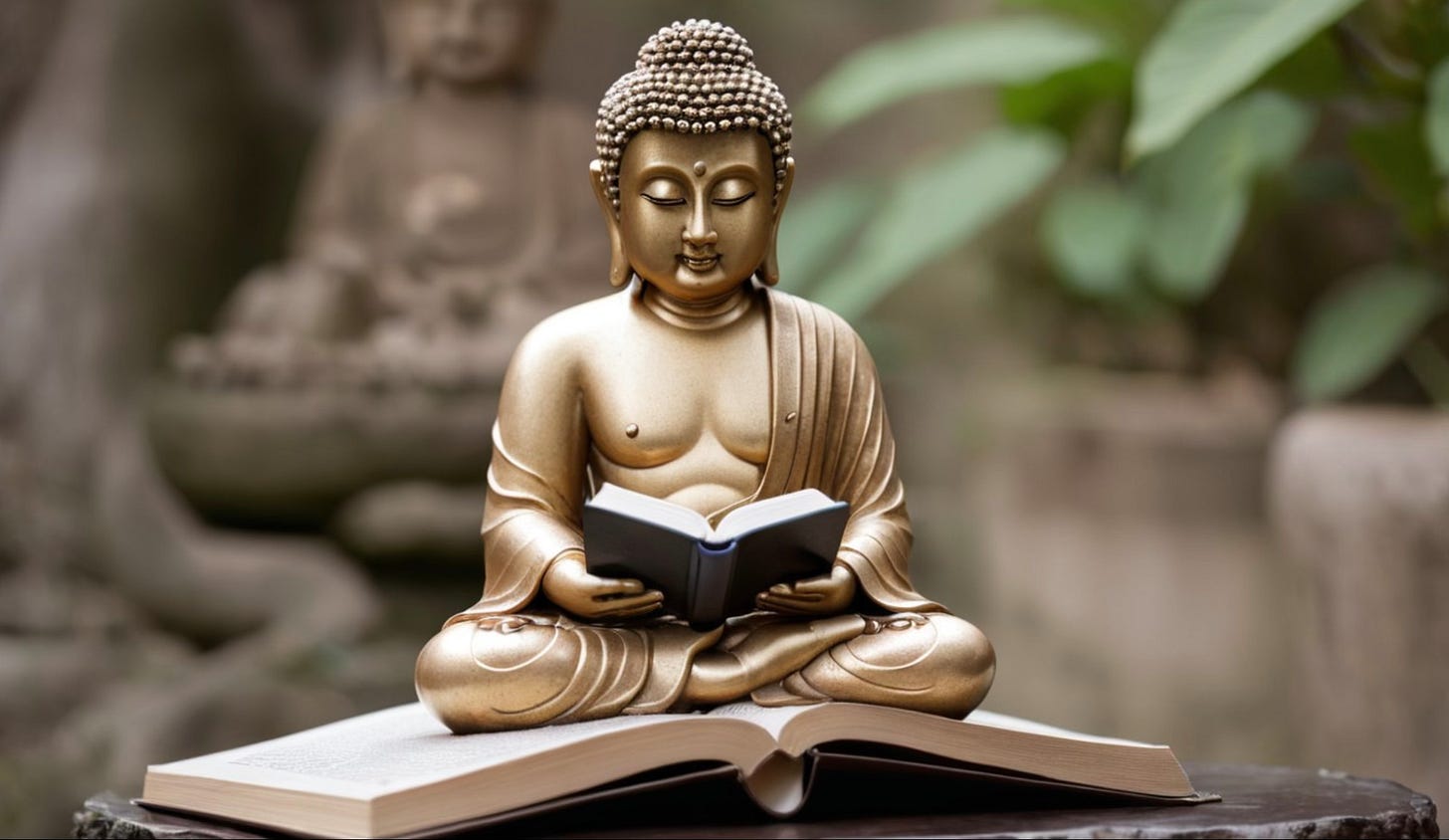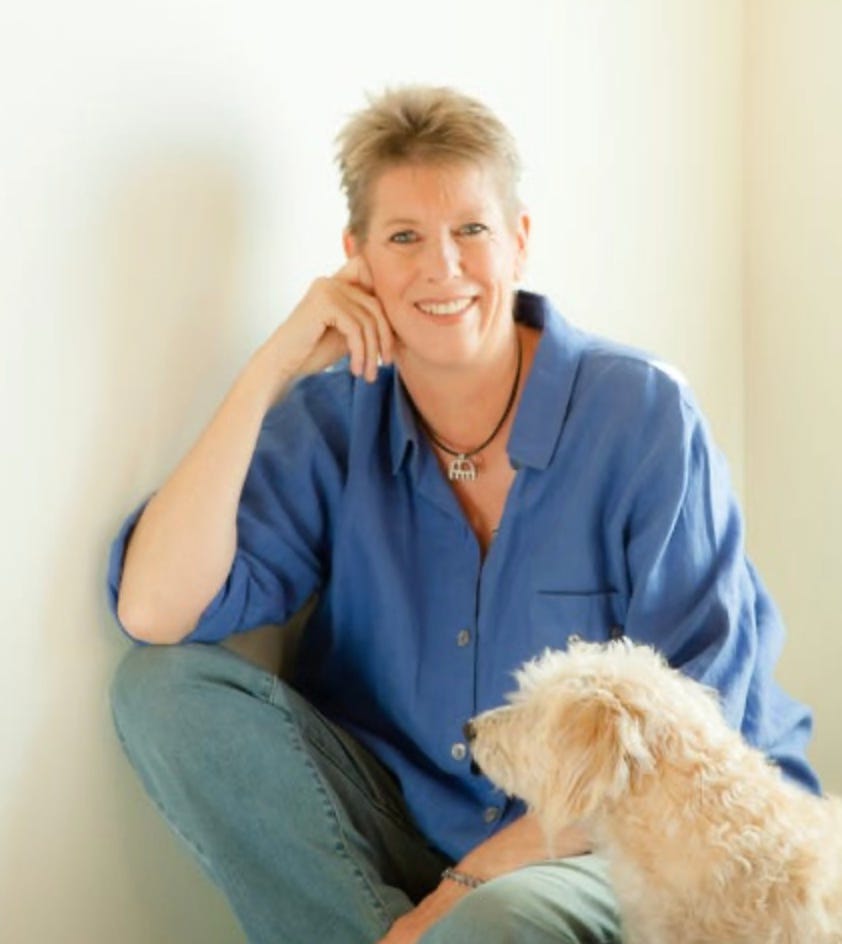Welcome to the May “Discovering Mindful Writers Q&A”. Each month, a guest writer will answer the same seven questions about their writing life.
I am delighted to welcome
this month. Maia is a writer, anthropologist and Zen practitioner who writes The Practice of Life, where she shares inspiration for personal and collective liberation.I hope you enjoy her answers to my questions. Do let us know what you think about the “mindful” word! Despite the title of my Substack, and my own mindfulness practice, I do get what Maia is saying about the use of mindfulness and like the idea of “heartful”.
If you’d like to be a guest on this monthly feature and answer these questions, do get in touch. At the moment, the next free spot is in October 2024.
With love,
What does mindful writing mean to you?
I have to start with a moment of honesty — I’ve actually grown quite weary of the word “mindful”! I realize this is kind of a blasphemy given the title of your Substack and the interest in mindfulness. But let me explain, and perhaps it’s connected to your question.
To me, one of the most important elements of mindfulness practice is that we get to discover what it means to be a beginner, over and over, and we experience the gift of seeing the world anew with every conscious breath. Because I love language, I love the experience of finding new ways of saying things and creative ways to employ words. When the same word is used over and over to the extent that it begins to lose its original freshness, I start seeking different words. Perhaps this makes me fickle! I prefer to think of myself as a word connisouer who is forever on a journey to use language in new and meaningful ways.
Which leads me back to “mindful.” About 20 years ago I was part of a research project at the Center for Contemplative Mind in Society, the intention of which was to explore applications of mindfulness and contemplative practices in secular settings (one of the best jobs I ever had, combining my interests in qualitative research and meditation and Buddhism). I was immersed in that word and everything related to it. This was back in the days when mindfulness was not on everyone’s radar like it is now. In fact that was one of the goals with the project, to support its introduction to mainstream culture. Well, we succeeded! Over the past 20 years, this explosion of interest in mindfulness has been amazing to witness.
At the same time, I could feel the vital meaning of the word started to drain out of it as everyone and their grandmother talked about “mindfulness” and even started selling it as a product. Sometimes it feels like a cliche to me. So I’m forever searching for other ways to describe that experience of open-hearted awareness. A dear friend of mine sometimes uses the word “heartfulness,” which I rather like as an alternative to “mindfulness."
To me, mindful (heartful!) writing simply means that I enter the act of writing as a practice opportunity, not an assignment. When writing is a practice, I am invited to slow myself down a bit and to settle into silence. From that space of stillness, I see what’s present in my heart and mind, and my pen follows that thread. So much can be learned from this practice!
How does a mindful writing practice fit into your wider mindfulness journey?
My writing practice is one of several practices that help keep me sane and kind to myself and others. Ideally every day I’ll also engage in a walking practice and sitting meditation practice (zazen). The sitting practice feels to me like the foundation for everything — cultivating that capacity for stillness in my mind, knowing how to come home to mind/body with every breath, is such an important skill to have. It is for me, anyway. The writing and the walking add different dimensions to that practice of presence — writing nourishes my creative and expressive self, and walking nourishes my body with movement as well as noticing whatever I encounter in the world.
What do you write? Essays, poetry, fiction, plays?
My writing almost always takes the form of creative non-fiction and essays. There have been times that poetry comes through me, but it’s not something I can sit down and intentionally make happen the way I do with creative non-fiction.
One year I signed up for NaNoWriMo and played with a piece of fiction for those 30 days of November. It was absolutely dreadful! But it was great fun to work on the other side of my brain (or whatever it was) to think like a novel writer and create characters and story lines from my imagination. But I’m definitely most comfortable with the non-fiction essay form.
What drives you to write?
Wow, that question kind of feels like, “What drives you to breathe?” It’s just something my soul has to do. It’s not that I write all the time, but it feels like the most natural way for me to get in touch with what I’m feeling and thinking, and to express it to others. I can’t imagine life without writing.
What stops you from writing?
Allowing a thousand things to distract me, to take priority over writing. I often need to remind myself that I am a writer, that one of the best investments of my time and energy is writing — not social media. Even here on Substack, as much as I find it more fulfilling than other social media platforms, it is so easy to get sucked into scrolling through Notes and getting lost there rather than dedicating time to my own writing. I truly enjoy connecting here with other writers and readers, but it can be a slippery slope.
Perhaps some of what contributes to this dynamic is my orientation toward introversion (I have to wonder if most writers have that!) and yet I truly love people and yearn for community. Sometimes I call myself a “gregarious introvert.” Writing can, at times, be a lonely pursuit. When I tip too far out of balance and don’t feel connected with others, I’ll seek out connection — sometimes at the expense of my writing. I’m trying to find that balance.
What do you hope to achieve with your writing?
I’ve spent a lot of time considering my intention — what’s at the heart of this particular round of living for me? It’s something I call a “Core Intention” in my book, Work That Matters (Parallax Press, 2017). Over time, as I’ve gotten to know myself, I’ve become pretty sure that my Core Intention is to “open hearts and minds” (including my own), and one of my primary ways of doing this is through writing. If I can work on a piece of writing and land up on the other side by surprising myself to have a different perspective on something I thought I knew, that’s what I’m aiming for. If the person who reads my work has their own perspective expanded, then I feel like I’ve done my job.
Anthropologist David Graeber wrote a wonderful book, Possibilities: Essays on Hierarchy, Rebellion, and Desire (AK Press, 2007). He opened the book in this way:
“I decided to call this collection Possibilities because the word encompasses much of what originally inspired me to become an anthropologist. I was drawn to the discipline because it opens windows on other possible forms of human social existence; because it served as a conscious reminder that most of what we assume to be immutable has been, in other times and places, arranged quite differently, and therefore, that human possibilities are in almost every way greater than we ordinarily imagine.”
I can’t think of a better way to describe what I hope to achieve with my writing.
How do you write? Are you a planner or do you just start writing from an idea and let it lead you?
Partially this depends on the kind of writing I’m doing. When I’m writing “on assignment” I tend more to planning, to thinking through a structure that might serve the topic and then creating an outline. The outline can of course change, but that gives me a roadmap for the writing. If I’m doing my own creative writing, I try to allow my mind and body to settle for a bit, and then to notice what starts to arise in me and follow that thread in my writing.
The past couple of months I’ve been participating in Summer Brennan’s “Year of Writing Dangerously” course here on Substack, and one of the tools she shared with us is an exercise called “Five Things” which very much situates writing as a practice in this way. I’ve also found it helpful at times to simply begin writing, even just a practice of describing what I see in front of me in as much detail as I can, and see where that leads. All of these approaches feel grounded in a mindful approach to writing. I’ve definitely noticed the quality of my writing has improved as I’ve merged it with mindfulness practice — it’s gained more detail and complexity (the good kind of complexity).
Thanks so much for your time and sharing your insights and inspirations, Maia.
Next month’s guest is
who writes Going Gently.







Lovely words from Maia. I said the very same thing about ‘mindfulness’ when I was teaching at my Buddhist Centre last weekend. Being mindful is a practice which is very radical, and allows us to connect with life in a way that is technicolour, vibrant, pulsing, energetic, and full of heart and joy. But the overuse has really dulled our sense of what it is, what it means, sadly.
Hello Amanda, my dear friend Paulette just forwarded your info on to me. I'm excited to learn more about your newsletter and you. And if you find my newsletter interesting, I'd love to be considered for your open slot in December. Cheers to this wonderful experience here on Substack.